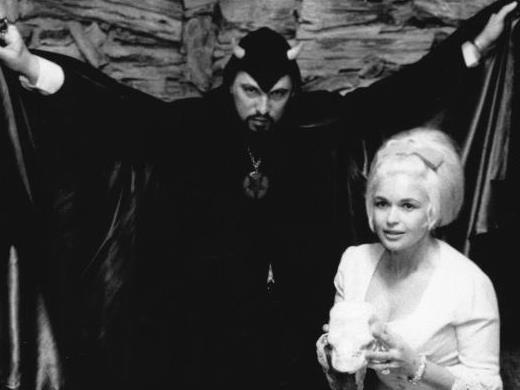Image: Anton LaVey and Jayne Mansfield star in Mansfield 66/67.
Some of the most interesting documentaries at this year’s Melbourne Queer Film Festival, according to the festival’s Program Director Spiro Economopolous, are those that focus on allies within the queer community, without necessarily featuring an LGBTI-identified protagonist.
‘The stories that people are telling kind of go a little bit deeper than just the experience of queer people being front and centre, but it’s also about who shapes these communities and who shapes these stories,’ he said.
Heading into its 28th year, the MQFF has a diverse offering of features, shorts, documentaries, and panel discussions. But it’s the narratives which feature queer allies that have Economopolous excited.
‘Susanne Bartsch: On Top, is a great example because she is a really interesting woman and she’s an ally. What’s intriguing about her story is that it’s told within the context of a queer community and what she’s brought to that community,’ he said.
‘She was a real taste-maker and she was really interesting in the club scene in New York back in the 80s where people like Ru Paul got their start. I think it’s great that there are these stories about these allies that are out there.’
The film is also showing as part of the Mardi Gras Film Festival and is a reminder of the importance of allies within the queer community, said Mardi Gras Film Festival Director Lisa Rose.
‘We often program films that are of interest to the LGBTIQ community, but aren’t always specifically about an LGBTIQ person. Allies are an important demographic of our wider community and when they have such a positive impact on queer people’s lives it’s great to showcase that.’
Also on the MQFF bill this year is a film about Hollywood icon actress Jayne Mansfield, retold through a particularly queer lens.
‘Mansfield 66/67 is interesting in that it doesn’t feature a queer protagonist as such, but reframes it in a queer context by the use of queer voices that comment and discuss Mansfield’s significance as a screen icon,’ Economopolous said.
‘Interviews with John Waters, Kenneth Anger, Cheryl Dunye and Peaches Christ all lend their voices to this unique story of Hollywood’s flirtation with satanism. And of course Mansfield’s exaggerated, larger than life persona make her ripe for queer/camp worship. I think it’s a fascinating looking at documentary that is queer more so in its presentation rather than its subject.’
Behind and in front of the camera
Other documentaries featured in this year’s festival see filmmakers explore social and political themes in addition to sexuality.
‘I think what punters and viewers are realising is that diversity in filmmaking, behind the camera and in front of the camera is making for interesting, original work,’ said Economopolous.
‘What I see happening with the documentaries is that a lot of the times queer filmmakers will take more of a personal essay approach to filmmaking.’
One of the films demonstrating this is Abu, offering an intimate insight into the life of a Pakistani immigrant who explores his sexuality while ruminating on his complex relationship with his father.
‘It’s about his personal journey and coming out to his family and also dealing with the conservative nature of his family and to them readjusting in another country,’ Economopolous said of Abu. ‘In this instance, the filmmakers are using documentary as a means to kind of relay their own story and within that story is the theme that they want to explore, which is migration and coming out, so they’re putting themselves sort of front and centre.’
A film about the first openly transgender firefighter in New York explores both what it’s like to transition and come out in a workplace steeped in machismo culture.
‘What’s interesting about Woman on Fire, and obviously at the forefront of that story, is trans visibility within a workforce that also touches on really interesting themes like women in the workforce, especially in a workplace that is particularly hyper-masculine like the New York fire department,’ Economopolous notes.
David McCarthy, sponsor of the Award for Best Feature Documentary at MQFF, said these stories are integral because they provide a raw depiction of the struggles and triumphs faced within the wider LGBTI community.
‘These documentaries, they’re a window on the world – on our world – and they’re stories that have to be told and need to be told,’ he said. ‘And they’re often told without having a commercial imperative behind making it and that makes them even more valid, I think, because they’re from the heart and that’s why I think they’re important.’
The Melbourne Queer Film Festival runs from 15-26 March 2018
The Mardi Gras Film Festival runs from 15 February – 1 March 2018





